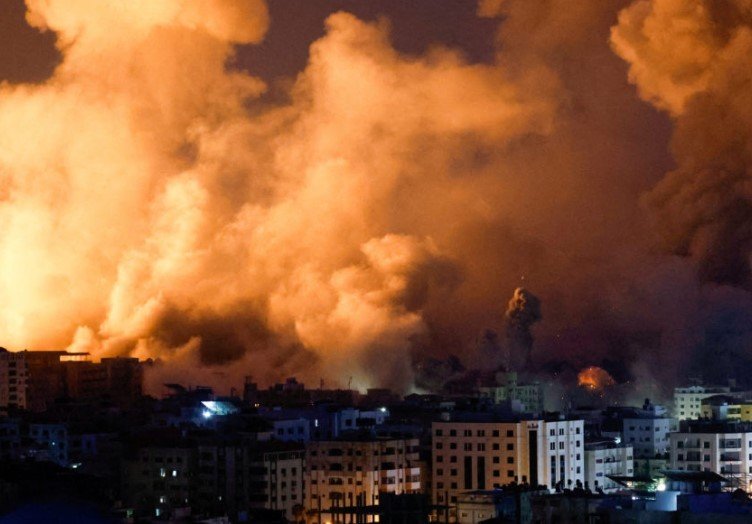A controversial U.S. plan to relocate Palestinians out of Gaza appears to have hit a brick wall — and according to Israeli sources, that wall was Saudi Arabia.
President Donald Trump, who floated the so-called “voluntary migration” idea earlier this year, reportedly dropped it after his visit to Riyadh, where Saudi officials made their opposition crystal clear.
Riyadh Said No — and Trump Listened
The original proposal from Trump raised international eyebrows. He talked about turning Gaza into the “Riviera of the Middle East,” a line that sounded like real estate marketing more than conflict resolution. But behind the glitz was a grim reality: moving hundreds of thousands of Palestinians out of their homeland.
That didn’t fly in Riyadh.
According to the Hebrew-language news outlet Walla, Israeli officials say the plan was still in circulation until Trump touched down in Saudi Arabia this summer. After his meeting with top Saudi officials — including Crown Prince Mohammed bin Salman — it vanished from Washington’s talking points.
Just like that.
One Israeli diplomatic source told Walla, “It became clear after the Riyadh trip that Saudi Arabia wouldn’t go along with any relocation plan. Trump needed their buy-in. He didn’t get it.”

Trump’s Gaza Migration Pitch Met with Global Outrage
Let’s rewind. Back in February, Trump floated the idea on U.S. television. He called it “voluntary,” but humanitarian groups said it was forced displacement dressed up in diplomatic spin.
It was met with fierce condemnation across the Arab world. Palestinians said it echoed the trauma of the Nakba — the 1948 exodus that left millions displaced.
Even within Israel, not everyone was on board. A few officials worried the idea could backfire and stir regional backlash. And it did.
One-word reactions from Middle East allies ranged from “unrealistic” to “dangerous.”
In fact, here’s what international rights groups said at the time:
-
Human Rights Watch called it “ethnic cleansing with a smile.”
-
Amnesty International warned it could “violate international humanitarian law.”
-
The Arab League issued a rare joint rebuke, labeling it “a provocation that threatens regional stability.”
Saudi Officials Want a Deal — But Not That Deal
Saudi Arabia has made clear it wants to be seen as a major regional powerbroker. But any solution that involves displacing Palestinians would torpedo its credibility, especially with Arab and Muslim populations already critical of warming Saudi–Israel ties.
And for Saudi rulers, image matters — especially as they eye normalization talks with Israel down the line.
Two people familiar with Riyadh’s diplomatic posture say Crown Prince Mohammed bin Salman “wasn’t just opposed — he was adamant.” That’s the word one Gulf diplomat used. “There’s no future Saudi-Israel deal without a serious political path for Palestinians,” the source added.
One sentence summed it up: “Relocation is a red line.”
Ceasefire Talks Still Drag On With No Deal in Sight
While Trump was recalibrating in Riyadh, ceasefire talks were inching forward in Cairo and Doha — but not by much. Hamas announced Thursday it’s ready to release 10 hostages as part of a wider truce, but said Israeli “intransigence” is making things difficult.
Three core demands are holding things up:
-
Full Israeli withdrawal from Gaza
-
Real guarantees of a lasting ceasefire
-
Uninterrupted humanitarian aid and reconstruction access
Israel, for its part, is asking for more hostage releases before pulling troops out.
And Trump, speaking to reporters earlier this week, insisted there’s a “very good chance” of a ceasefire soon. He didn’t say if that included the full withdrawal Hamas wants — or if Saudi Arabia’s intervention shifted his broader Mideast playbook.
A Look at Trump’s Middle East Moves in 2025
To understand the context here, it’s helpful to see how Trump’s strategy has evolved since his return to the White House. Here’s a snapshot:
| Month | Trump’s Middle East Moves |
|---|---|
| Jan | Calls for Gaza “migration” plan |
| Feb | Meets Netanyahu in Washington |
| Apr | Pushes for trilateral ceasefire talks (Egypt–Qatar–US) |
| June | Visits Riyadh, signs new strategic agreements |
| July | Gaza relocation plan dropped post-Riyadh |
It’s clear something changed after the Saudi meeting.
Why This Moment Could Shape Regional Politics for Years
This isn’t just about Gaza. The quiet Saudi veto — if confirmed — shows how Riyadh is flexing its diplomatic weight.
And it signals a shift: Gulf states, especially Saudi Arabia, are no longer willing to just rubber-stamp U.S. or Israeli plans without their own interests front and center.
For Palestinians, it’s a rare moment of regional backing that doesn’t come from slogans or rallies — but from actual diplomatic clout.
That could change the dynamics for years.
